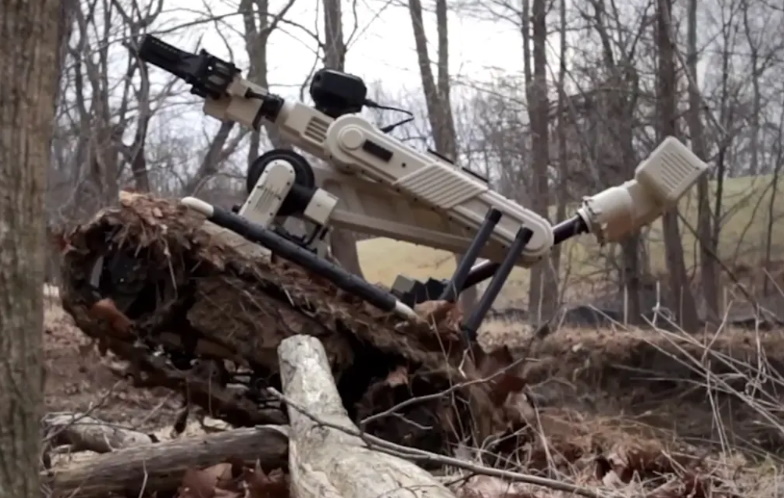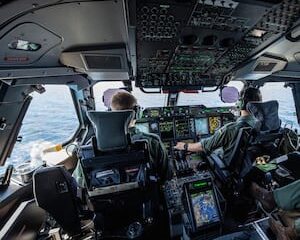Politics
New Zealand Defence Force Considers Israeli Drones Amid Rising Demand

The New Zealand Defence Force (NZDF) is contemplating the acquisition of drones from Israeli manufacturers as the global demand for advanced military drones surges during the ongoing conflict in Gaza. Notably, Israel is recognized for producing some of the most sophisticated drones available, which have been pivotal in contemporary warfare.
In 2019, the NZDF purchased bomb-clearing robots from the Israeli firm Roboteam, reflecting an established relationship prior to the recent escalation in drone warfare. Recently, Roboteam described the situation in Gaza as unleashing an “orchestra” of drones, highlighting the integration of drones with unmanned ground vehicles (UGVs) for enhanced operational capabilities. The firm noted this represents a significant shift from previous restrictions on weaponizing drones.
The NZDF has clarified that its procurement policies do not allow for the exclusion of suppliers based solely on their country of origin. According to official statements, “The NZDF will exclude a supplier from the tender process if it has sufficient grounds to believe there is evidence of human-rights violations by the supplier or in the supplier’s supply chain.” Despite this, the NZDF acknowledged it lacks a formal process to assess such concerns, although they may be raised during due diligence checks.
Absence of Drone Development Strategy
As drones increasingly become critical to military operations, the NZDF has admitted it currently does not possess a dedicated strategy or doctrine for drone development. In response to an Official Information Act request, the NZDF stated, “The New Zealand Defence Force does not have drone development strategies nor does it have doctrines around drone development.” This gap raises questions about the country’s preparedness to integrate such technology into its military framework.
Furthermore, the NZDF revealed it operates without a centralized drone purchasing system. Individual military units procure drones based on their specific needs, which deviates from a cohesive national strategy. The last briefing on drone capabilities was conducted with Defence Minister Judith Collins approximately 19 months ago.
During a press conference on March 14, 2024, Collins announced plans to procure $2.7 billion worth of US maritime helicopters and large aircraft, as outlined in the Defence Capability Plan released in April. When questioned about future drone acquisitions, she stated, “Oh, absolutely,” but expressed a preference for domestic purchases, saying, “I hope we are buying from New Zealand.”
International Context and Local Implications
Collins emphasized the need for New Zealand to maintain interoperability with allied nations, particularly Australia, which recently unveiled plans to invest over $1 billion in drone and counter-drone technologies over the next decade. The Australian government has launched Project LAND 156, with significant contracts already awarded to local firms for counter-drone systems.
Despite this focus on local procurement, Australia has previously acquired drones from Israeli firm Elbit. Recently, a Skylark reconnaissance drone manufactured by Elbit crashed in Gaza, raising concerns about the use of such technology in conflict zones. The Jerusalem Post noted that these drones could assist in coordinating artillery fire, highlighting their strategic significance.
Meanwhile, the NZDF continues to explore various drone options, including those from Roboteam, which it described as a civilian-focused company with experience in mobility systems. The NZDF reiterated it has not excluded Roboteam from any procurement processes based on its Israeli ownership, emphasizing the company’s commitment to humanitarian applications.
The $12 billion defence capability plan envisions the NZDF expanding its air and sea drone capabilities by 2029. The recent acquisition of four types of surveillance drones did not involve any Israeli products. In accordance with government procurement rules, the NZDF confirmed it has not barred Roboteam based on the company’s country of origin.
As the demand for advanced military drones grows, New Zealand’s approach to procurement and development in this area will be closely monitored, particularly in light of the ethical considerations surrounding the use of such technology in conflict zones.
-

 World1 week ago
World1 week agoPrivate Funeral Held for Dean Field and His Three Children
-

 Top Stories2 weeks ago
Top Stories2 weeks agoFuneral Planned for Field Siblings After Tragic House Fire
-

 Sports3 months ago
Sports3 months agoNetball New Zealand Stands Down Dame Noeline Taurua for Series
-

 Entertainment3 months ago
Entertainment3 months agoTributes Pour In for Lachlan Rofe, Reality Star, Dead at 47
-

 Entertainment2 months ago
Entertainment2 months agoNew ‘Maverick’ Chaser Joins Beat the Chasers Season Finale
-

 Sports3 months ago
Sports3 months agoSilver Ferns Legend Laura Langman Criticizes Team’s Attitude
-

 Sports1 month ago
Sports1 month agoEli Katoa Rushed to Hospital After Sideline Incident During Match
-

 World2 weeks ago
World2 weeks agoInvestigation Underway in Tragic Sanson House Fire Involving Family
-

 Politics2 months ago
Politics2 months agoNetball NZ Calls for Respect Amid Dame Taurua’s Standoff
-

 Top Stories2 weeks ago
Top Stories2 weeks agoShock and Grief Follow Tragic Family Deaths in New Zealand
-

 Entertainment3 months ago
Entertainment3 months agoKhloe Kardashian Embraces Innovative Stem Cell Therapy in Mexico
-

 World4 months ago
World4 months agoPolice Arrest Multiple Individuals During Funeral for Zain Taikato-Fox





















